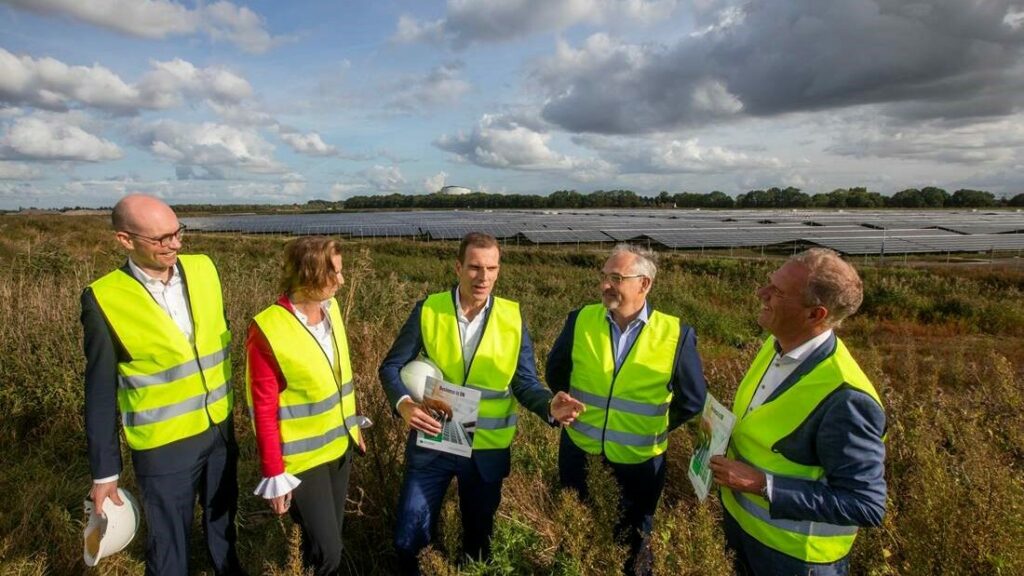- BNP Paribas Foundation has renewed its partnership with Youth Fund Sport & Culture for another three years via the Dream Up program, which supports cultural and social projects.
- The Dream Up program of the BNP Paribas Foundation offers children around the world the opportunity to discover and develop their artistic talents.
- Thanks in part to this support, the successful pilot ‘Youth Fund Let’s Dance’ was launched in the summer of 2024.
The successful collaboration between Youth Fund Sport & Culture and the Dream Up program of the BNP Paribas Foundation has been extended for three more years. As a partner, BNP Paribas has supported projects through the Dream Up program since 2018, helping children from families in financial hardship to discover and develop their talents. Over the past years, BNP Paribas contributed to projects including the El Jackson Education project and the pilot ‘Youth Fund Let’s Dance’.

In the summer of 2024, the pilot ‘Youth Fund Let’s Dance’ was organized. Many children who grow up in families facing financial challenges want to dance but do not have the financial means or access to a nearby dance school. ‘Youth Fund Let’s Dance’ comes to where the children are. Together with local dance schools and professional dance teachers, the Youth Fund organized free lessons on town squares and open spaces in neighborhoods. For six weeks, the participating children worked two hours a week to put together a spectacular final show. During the lessons, they tried different dance styles, such as hip-hop and breakdance, and were encouraged to further develop their talent.
“As a sports enthusiast, I am very proud that we will continue our collaboration with Youth Fund Sport & Culture for the next three years to help realize their mission: making participation in sports and culture accessible to everyone. Promoting social inclusion is a core value for BNP Paribas, and experiencing sports and culture brings people together.”


“I am very pleased that we can continue supporting Youth Fund Sport & Culture for another three years with the pilot ‘Youth Fund Let’s Dance.’ With this program, we want to give children the opportunity to get to know and love dance. We also want to teach them to trust their bodies, which will help them gain more self-confidence.”
Petra Bosman, Director of the Youth Fund Sport & Culture: “The Youth Fund Sport & Culture is very pleased with the long-term collaboration with BNP Paribas. Every child in the Netherlands has the right to participate in sports and culture, even if there is not enough money at home. Our collaboration enables more children to participate. They have fun, make friends, and discover their passion and talent. How wonderful it is that the Youth Fund can make this possible by paying their membership or tuition fees!”
The renewed cooperation with BNP Paribas will also focus in the coming years on the talent development of children growing up in disadvantaged families. Additionally, the contribution of BNP Paribas will be used for memberships in sports and cultural clubs. This will allow children to participate structurally and further develop their talents.
Read more about the projects supported by Youth Fund Sport & Culture.
On Thursday, 20 June, from 15:00 to 15:45 hours, BNP Paribas and the Dutch Association of Investors for Sustainable Development (VBDO) will host a webinar on integrating biodiversity policy into corporate strategy. Freek van Til, Project Manager at VBDO, and Camille Maclet, Global Biodiversity Lead at BNP Paribas Group, will share their perspectives on the financial risks of biodiversity loss and how to mitigate these risks and counter biodiversity loss.
Making businesses accountable for preserving and restoring biodiversity starts with providing insight. An initial step is to encourage companies to conduct a baseline measurement, which makes biodiversity loss visible and turns it into a ‘manageable problem’ for policymakers. By involving the entire organization in the results and collaborating with nature organizations and ecologists, effective policies can be developed to gradually improve the baseline situation. Various methodologies are available for this purpose.
Measurability makes a problem manageable and is therefore crucial to the success of biodiversity policy. By quantifying biodiversity and its loss, companies can formulate clear and achievable goals. For example, “Within three years, we aim to increase the number of native plant species on our premises by 20%.” Setting targets according to the SMART methodology (Specific, Measurable, Acceptable, Realistic, and Time-bound) simplifies measuring effectiveness.
Nature Ladder
A practical step towards achieving biodiversity goals is the use of the ‘Nature Ladder’. This ladder offers a structured method for systematically assessing the impact of projects and business activities:
- Nature-Unaware: building without considering the impact on nature.
- Nature-Friendly: ad-hoc implementation of nature-inclusive initiatives.
- Nature-Conscious: structurally integrating nature-inclusive building by identifying opportunities for nature and discussing them with the project developer.
- Nature-Inclusive: engaging various stakeholders, alongside the client, to sustainably enhance local biodiversity and natural capital.
- Nature-Adaptive: building in harmony with nature, fully integrating biodiversity and climate adaptation.
Mitigation Hierarchy
For a systematic approach that is broadly applicable to production processes and supply chains, the mitigation hierarchy provides useful guidelines. This hierarchy consists of four steps: avoid, minimize, restore, and compensate. The primary goal should be to avoid negative impact. When unavoidable, impacts should be minimized. In damage occurs, companies have a responsibility to restore affected ecosystems. As a last resort, compensation can be used to offset remaining negative impacts.
“Companies are increasingly aware of their dependence on their natural environment and are proactively looking for ways to contribute to the restoration of biodiversity. With smart measurement tools, the impact of business activities becomes visible, making it easier to take measures that have a positive, or at least not negative, impact. Raising awareness and making the issues visible, is a powerful combination to start addressing the biodiversity crisis. Ensuring a healthy planet for future generations is everyone’s responsibility.”
Freek van Til, VBDO Project Manager Sustainability & Responsible Investing
Interested to join the webinar? Register here.
Date: 20 June, 15:00 – 15:45
The webinar will be in English
According to a widely shared scientific consensus biodiversity is declining rapidly: currently about one million animal and plant species are threatened with extinction, as a direct result of human activities. Climate and biodiversity are closely linked, and biodiversity cannot be protected without simultaneously addressing climate change. However, unlike the Paris Agreement, which contains firm commitments to limiting carbon emissions, no long-term global targets have been set for biodiversity protection, even though the immediate natural environment has a major impact on the economic activities it can facilitate.
Financial institutions are aware of the need to stop the degradation of our environment and reverse this trend. By examining how organisations are exposed to nature-related risks, and by raising awareness among market participants concerning the significant associated financial risks, aside from the commercial opportunities, we can transition to an economy that impacts nature more positively. To accelerate this process, BNP Paribas has been on the Taskforce on Nature-related Financial Disclosures (TNFD) since 2021. By identifying risks, the TNFD can be a driving force in shifting financial flows, towards activities with a positive impact on nature.
An example of how sustainable energy generation and the protection of biodiversity can go hand in hand is BNP Paribas’ lease construction for over 28,000 solar panels at the Cosun Solar Park. This solar park is part of the rezoning of an industrial reallocation of former factory land. This site is being redeveloped into a sustainable business park with a harbour basin. The seven-hectare solar park is owned by Cosun and will be directly connected to the nearby Cosun Beet Company specialty factory, making the factory’s electricity consumption sustainable.

Paul Hagens, project leader of Cosun Solar Park Puttershoek: “The solar park is designed to maximize the sustainable energy yield per surface area. This will leave more of the surrounding area available for nature. The embankment around the solar farm makes the solar panels barely visible to local residents. The embankment itself is managed with sheep and is overgrown with various plants and flowers. Moreover, the solar panels appear to act as a shelter for various animals and provide them with shade.”
Robert-Alexandre Poujade, ESG Analyst & Biodiversity lead at BNP Paribas Asset Management: “This year, BNP Paribas Asset Management published its first biodiversity report. These first results allow us to increase our expertise in this area and to identify the environmental impact of our activities. In addition to the development of the analytical frameworks we are developing with TNFD, we will continue to integrate relevant biodiversity data into our own ESG rating system, to enrich our voting policy and shareholder engagement.”
READY FOR MORE INSPIRATION?
Interested to read more from our insights series on how to accelerate sustainable transitions? We have a few suggestions you may like as well:
At least 15,000 Dutch citizens don’t have access to necessary resources to be able to participate digitally. This is the conclusion we made one week after starting the campaign #allemaaldigitaal (#alldigital). NLdigital collaborates with the government and social organizations to collect and distribute laptops and tablets. Thanks to the support and effort of our partners, we are currently counting 1,500 devices. But the demand is much higher.

Through this campaign alone we have received over 10,000 requests for laptops for school children. And we are receiving new requests daily. Also outside of education the demand for laptops and tablets are really high, for example at healthcare institutions, welfare organizations, neighborhood teams and other social organizations. The city of Amsterdam for example has received more than 4,000 requests from these groups in less than a week time. Thanks to several organizations within #allemaaldigitaal combining their forces, they have created a more transparent overview of the actual demand.
It’s about groups that are already less visible. Now that everyone is obliged to stay at home because of the current corona situation, there’s a risk that these people will be isolated even more. We really have to prevent this from happening.” – Laurentien van Oranje, who is involved in the project on behalf of the Alliantie Digitaal Samenleven.
To be able to meet the demands, #allemaaldigitaal bundles all available supply regarding new and used laptops and tablets. In less than a week time 1,500 used laptops have been donated, which are being cleared up and refurbished by volunteers from Centralpoint, PQR, and NEG-ITSolutions. Thanks to KPN and VodafoneZiggo we can also offer internet connection with Wi-Fi if necessary.
Financial contributions are also welcome.
The campaign also accepts financial contributions, with which they can buy refurbished laptops themselves. In this way, BNP Paribas donated a sum, from which 1,000 laptops can be bought for school children.
Geert Lippens, CEO BNP Paribas the Netherlands:
“Today, more than ever the importance of digital technology in our society is growing explosively. We have to ensure that the gap in our society will not increase. It is unacceptable that there are children nowadays who cannot do their schoolwork, simply because they do not have a laptop or tablet. We would like to support these children with our contribution.”
We hope to receive more donations like this on short term, so that we can aid as many people as possible:
Lotte de Bruijn, director of NLdigital:
“It is amazing how much help and positive reactions we have already received, but to help everyone we still need more. The next weeks will be all hands on deck: whether you still have laptops laying around or are able to do a financial donation, all help is welcome.”